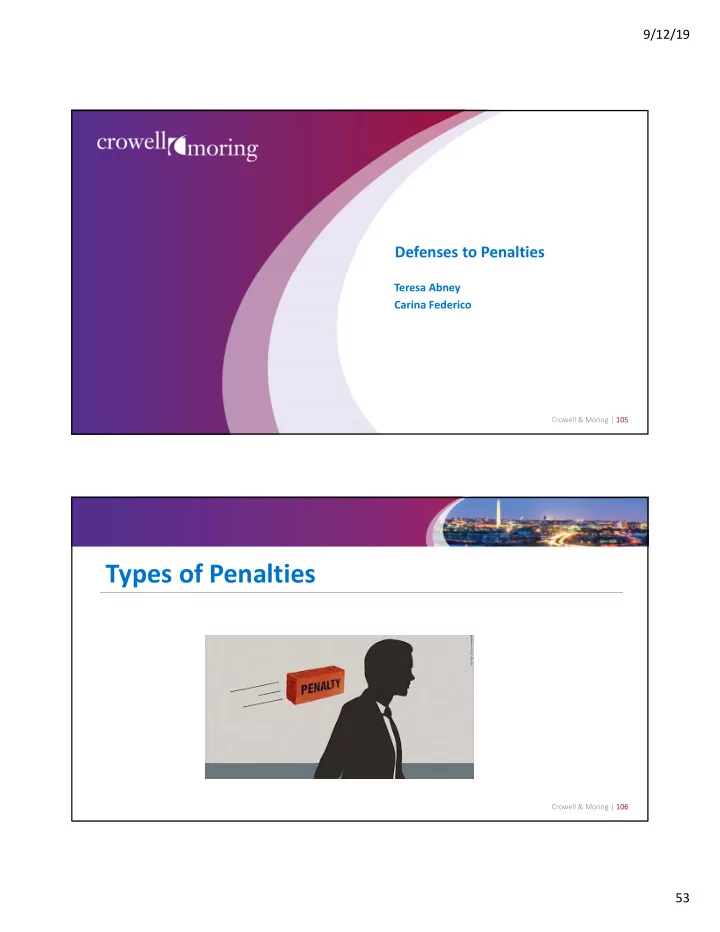

9/12/19 Defenses to Penalties Teresa Abney Carina Federico Crowell & Moring | 105 Types of Penalties Crowell & Moring | 106 53
9/12/19 Types of Penalties • Delinquency (§6651) • Non‐fraudulent failure to file: 5% of net tax due per month, up to 25% • Fraudulent failure to file: 15% of net tax due per month, up to 75% • Failure to pay: 0.5% of net tax due per month, up to 25% • Accuracy‐Related (§6662): 20% of underpayment attributable to the following: • Negligence or disregard of rules or regulations • Substantial understatement of income tax • Noneconomic substance transactions Crowell & Moring | 107 Types of Penalties • Reportable Transaction Understatement (§6662A): 30% of understatement of tax resulting from undisclosed reportable transaction • Civil fraud (§6663): 75% of any portion of an underpayment attributable to fraud • Foreign‐related penalties • FinCEN Form 114: Report of foreign bank and financial accounts • Form 5471: Information Return of U.S. Persons with Respect to Certain Foreign Corporations • Form 5472: Information Return of a 25% Foreign‐Owned U.S. Corporation or a Foreign Corporation Engaged in a U.S. Trade or Business Crowell & Moring | 108 54
9/12/19 Defenses to Penalties Crowell & Moring | 109 Defenses to Penalties • Administrative waiver: IRS may provide administrative relief from penalties, for example, in the event of delay by the IRS in preparing forms or publishing guidance • First Time Abatement: IRS may provide administrative relief the first time a taxpayer is subject to penalties for failure to file, failure to pay, and failure to deposit • Disclosure: Certain accuracy penalties do not apply if the taxpayer’s position contrary to a rule or regulation has a reasonable basis in law and is disclosed on the return Crowell & Moring | 110 55
9/12/19 Defenses to Penalties • Statute of Limitations Defense • Proper calculation of penalty amount • Constitutional Defenses • 8th Amendment • 5th Amendment • Strict liability penalties • Failure to disclose reportable transactions (§6707A) • Noneconomic substance transaction penalty (§§6662(b)(6); 7701(o)) Crowell & Moring | 111 Defenses to Penalties • Qualified Amended Returns • Disclosures can be made on a qualified amended return • Amounts of tax reported on a qualified amended return will be treated as if they had been reported on the original return for purposes of computing the amount of the tax “underpayment” unless the original return reported a fraudulent position • To be “qualified,” the amended return must be filed before: • The date the taxpayer is first contacted concerning an IRS exam • In the case of a promoted transaction, the date the shelter promoter is first contacted concerning an IRS exam • In the case of a pass‐through item, the date the pass‐through entity is first contacted concerning an IRS exam • The date a John Doe summons is served on a third party with respect to an activity of the taxpayer for which the taxpayer claimed a tax benefit • The date on which the IRS announced a settlement initiative for a listed transaction Crowell & Moring | 112 56
9/12/19 Defenses to Substantial Understatement Is the weight of the Do any of the following authorities supporting the types of authority exist? position “substantial” Is there a “tax Yes (i.e. IRC, regulations, compared to the contrary shelter” item? No revenue rulings, revenue authorities? procedures, tax treaties, court cases, PLRs, TAMs) No Was the position Was the properly sustained? Yes position Yes Is there a adequately “reasonable disclosed? basis” for the position? Crowell & Moring | 113 Defense to Negligence The 20% penalty for negligence can be avoided if there is a “reasonable basis” for the tax position Penalties Is there a No “reasonable basis” for the position ? No penalties Yes Crowell & Moring | 114 57
9/12/19 Defense to Disregard of Rules The 20% penalty for the disregard of rules and regulations can be avoided if there is a “reasonable basis” for, and adequate disclosure of, the tax position Penalties Penalties Penalties No No No Is there a Was the position Was the position “reasonable properly adequately No penalties basis” for the Yes Yes sustained? Yes disclosed? position? Crowell & Moring | 115 Reasonable Cause Defense • The exercise of “reasonable cause and good faith” can be a complete defense to penalties (§6664) • Factors considered include the extent of the taxpayer’s effort to assess the correct tax liability and taxpayer’s education, sophistication, and business experience (Reg. §1.6664‐4) Crowell & Moring | 116 58
9/12/19 Reasonable Cause Defense • But relying on the advice of counsel will most likely result in a waiver of all advice on the same subject matter – no “sword and shield” What Could Be Waived? • Opinions (including drafts) • Emails between lawyers and economists • Emails between advisor and client • In‐house communications • Advisors’ internal emails • Communications with financial auditor Crowell & Moring | 117 Ways to Make a Reasonable Cause Defense • Written requests • Deficiency procedures/appeals • Claim for refund Crowell & Moring | 118 59
Recommend
More recommend